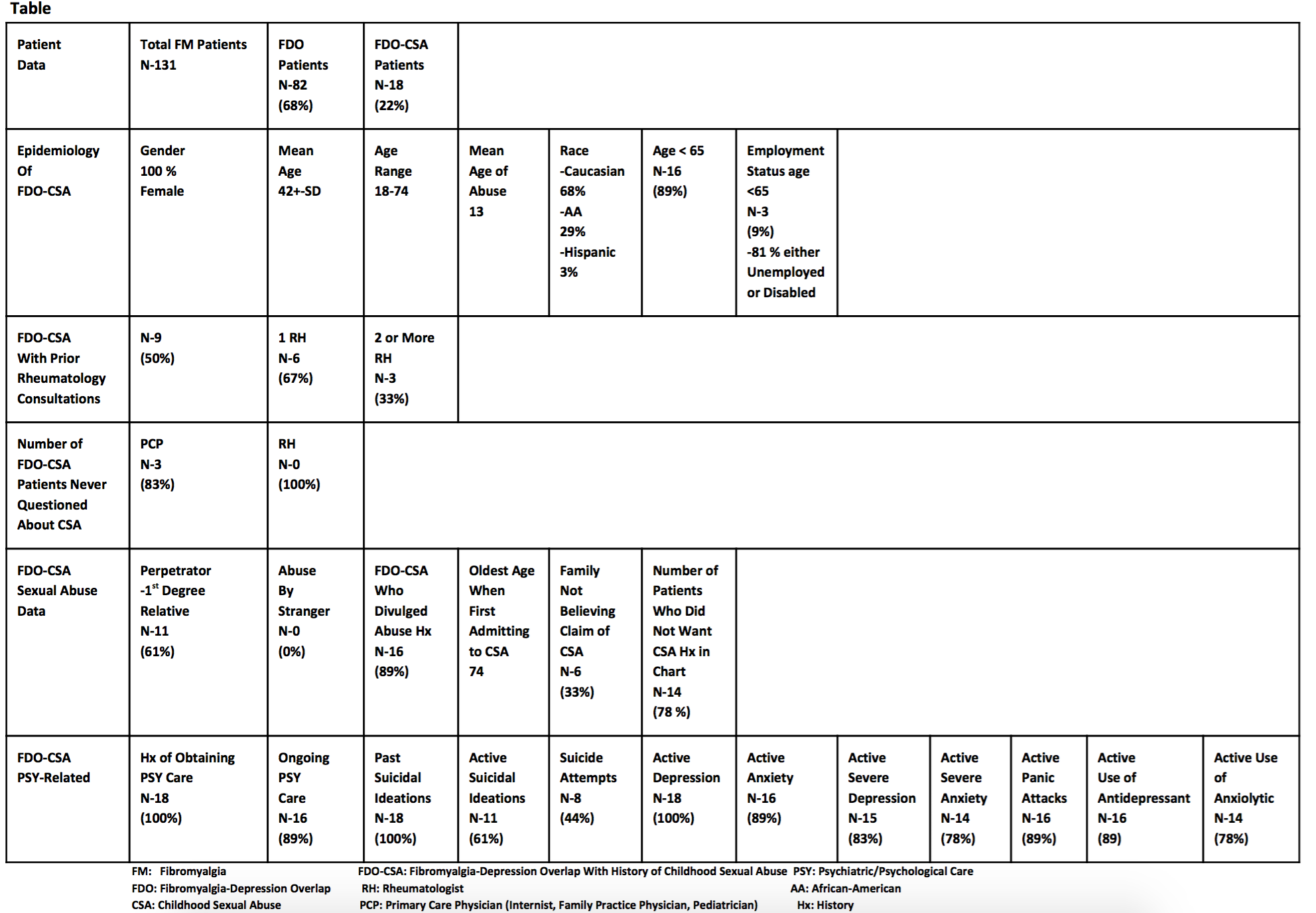Session Information
Date: Sunday, November 5, 2017
Title: Fibromyalgia, Soft Tissue Disorders, Regional and Specific Clinical Pain Syndromes Poster I
Session Type: ACR Poster Session A
Session Time: 9:00AM-11:00AM
Background/Purpose: Depression is reported in as many as 71% of patients with Fibromyalgia (FM). An association between Childhood Sexual Abuse (CSA) and FM has been well documented and is responsible for inducing disturbing levels of chronic physical and psycho-affective morbidity. Based on the 28-year experience of the lead author, the frequency of CSA in patients with Fibromyalgia-Depression Overlap (FDO) is thought to be highly underestimated, principally due to the underutilization of validated screening questions by Rheumatologists (RH), Internists and Family Medicine Physicians (PCP). We primarily sought to determine the frequency of CSA screening by RH and PCP in patients with FDO and the incidence of CSA in new patients with FDO. Additional clinical and psychosocial variables were secondarily assessed.
Methods: A retrospective analysis conducted over a 12 month period in an outpatient, community-based, solo private practice setting of 131 consecutive new adult patients diagnosed with FM by one RH. All patients were screened for depression, anxiety and CSA using validated tools(PHQ-9, GAD-7,Gen Hosp Psychiatry. 2007 Jan-Feb;29(1):8-13) . CSA patients were asked whether past and/or present PCP and past RH inquired about CSA. All patients met the 2010 ACR criteria for FM.
Results: All data is summarized in Table. Noteworthy clinical findings included: Of the 131 FM patients, 100% were female, 82 (63%) were diagnosed with FDO and 18 (22%) of FDO patients revealed they were victims of CSA; CSA was not encountered in the non-FDO population; CSA mean age was 42 with an age range of 18-74; mean age at time of abuse 13; oldest age when CSA first divulged was 74; 16 (89%) of CSA patients were under age 65 and of these 13 (81%) were either on disability or unemployed; 6 (33%) family member(‘s) did not believe claim of CSA; 14 (78%) of CSA patients requested that abuse history not be included in the medical record; 11 (61%) of assailants were 1st degree relatives; CSA patients never queried by physicians about sexual abuse: active and/or past PCP 15 (83%) and past RH 9 (100 %); Psychiatric/Psychological care given in 18 (100%) of CSA patients; 18 (100%) of CSA patients experienced past suicidal ideations and 11 (61%) active suicidal ideations; 8 (44 %) attempted suicide; 18 (100%) had active depression and 16 (89%) had active anxiety; 15 (83%) active severe depression; 14 (78%) active severe anxiety; 16 (89%) active panic attacks.
Conclusion: The structure and small sample size of this investigation limits our ability to draw definitive conclusions. However, these data reveal that in an alarmingly high number of FDO patients previously evaluated by RH and PCP, CSA escaped detection. The results of this analysis highlights that patients with FDO-CSA likely represent a particularly at-risk population who are in need of greater physician awareness and a more focused assessment. A multi-state study addressing this topic is in progress.
To cite this abstract in AMA style:
Albornoz MA, Albornoz C, Clauw DJ. Lack of Screening By Rheumatologists and Primary Care Physicians for Childhood Sexual Abuse in Patients with Fibromyalgia-Depression Overlap: An Unrecognized Crisis? [abstract]. Arthritis Rheumatol. 2017; 69 (suppl 10). https://acrabstracts.org/abstract/lack-of-screening-by-rheumatologists-and-primary-care-physicians-for-childhood-sexual-abuse-in-patients-with-fibromyalgia-depression-overlap-an-unrecognized-crisis/. Accessed .« Back to 2017 ACR/ARHP Annual Meeting
ACR Meeting Abstracts - https://acrabstracts.org/abstract/lack-of-screening-by-rheumatologists-and-primary-care-physicians-for-childhood-sexual-abuse-in-patients-with-fibromyalgia-depression-overlap-an-unrecognized-crisis/

